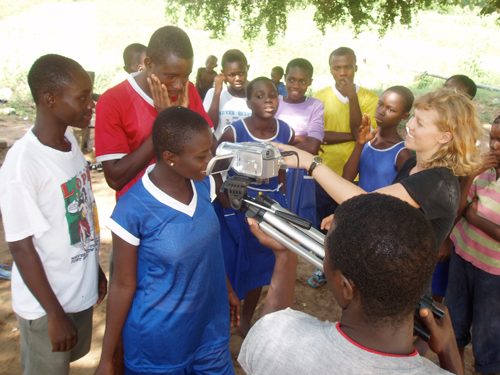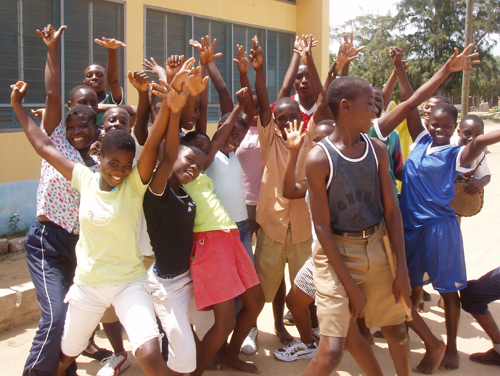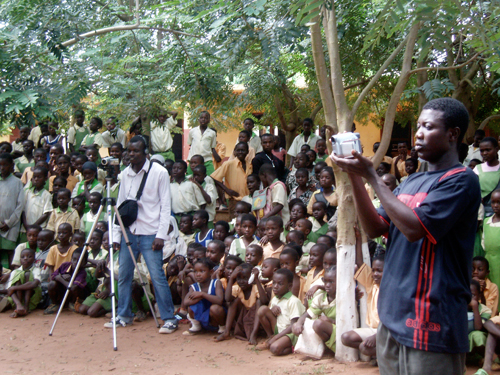Youth Communicating Through Art
Featured Community Voice: Anya Kandel, Momentus International
Anya Kandel, founder and creative director of Momentus International, is sparking a global conversation among youth. Working with young people in California, Ghana and the Netherlands, her organization provides a creative space for them to communicate with and empower one another through the universal language of the arts.

Crossing Borders through Art
What if we had no words to tell our story?
I have seen, first hand, that the arts can provide a creative and powerful way of communicating beyond what words can express. The arts lay bare the issues that most affect us and open up alternative ways of approaching things.
Today's youth are our future leaders. As the global economy plummets and environmental and health problems increase, we need to build tomorrow's world in a sustainable way. Teaching youth to communicate across borders is essential to that process.
A large aspect of Momentus is interactive. We travel to a community and work with a specific group of youth; with the help of local artists, the youth discuss issues of importance in their local and global community, ask questions of their peers in other countries, and create a performance which expresses who they are and what they want to say to the world.
This process is filmed and then brought to another group of youth, who respond and continue the conversation.
We are in the process of building a Web site that will serve as a venue for discussion and facilitate other creative forms of conversation.
Asking Questions
In Ghana, we've worked with over 150 youth in three different regions. One of the most important things the youth in Ghana wanted to convey to the world was that they are competent and active participants in the global community.
Sometimes the simplest questions from one country have spurred the most interesting discussions and responses in another.
Questions range from global concerns to more personal and immediate ones: "Why do oil and war go together?" "Do your parents find it difficult to apologize to you when they do something wrong? Because my parents do."
Often, the questions are just as revealing as the answers. For example, in one conversation exchange between students in Ghana and the Netherlands, a Ghanaian student asked: "How many children do typical Dutch families have?" A Dutch girl enthusiastically replied, "I will have two, of course! So I can put one on the front of my bike, and one on the back!"
This question prompted a conversation among the Dutch youth about the critical role children play in Ghanaian society. For the Ghanaians, it revealed the importance of bicycles in Dutch society. The curiosity and discussion about children promoted cultural understanding on both sides.
Overcoming Conflict with Theater
Momentus also aims to empower youth to transcend personal and cultural borders, promote peaceful relations and enable creative problem solving.
Toward the end of our Momentus Ghana project, a local tragedy reinforced the power of storytelling and the need for alternative means of communication--core values of our work.
During our work in Anloga, a town located in the Volta region on the east coast of Ghana, there was a chieftaincy dispute, which resulted in protests, police violence, and several deaths. A curfew was put into place; some people fled the city and others camped out in their houses to avoid the conflict.
In Ghana, where this kind of violence is so rare, the story made the front page of the national newspaper.
We resumed the Momentus project three days after this incident. Half of our participants had fled or remained in hiding. We were left with12 out of our original 24 junior high and high school students. What's more, we had only four days left to put on a performance for their school community.
With community unrest and under martial law, the remaining students were left with a tough decision: stop the project, create a performance for the camera alone or go on with the performance as scheduled. Despite the difficulties, they opted to move forward with the performance--in part as a response to the tragedy.
"We need to let others know that we are not a violent people," one of the youth explained. Another agreed, "People already think of Africa as a violent place. We are not. We must let people know that we are a peaceful people."
So, they created a performance that told the story of their town and its founding by ancestors who wanted to escape the rule of a corrupt chief. They told of Ghana's path to independence and the pride they felt in their community and as Ghanaians.
Finding Their Own Voice
For me, it was inspiring to see the Anlogan youth come together, and to be a part of the bond that developed between everyone over the course of this experience. Amidst conflict, the youth found a haven in Momentus. They channeled their upset toward a tangible goal and, in doing so, began the healing process in their community.
Although the experience helped bring people together, it's difficult for me to actually share this story. No matter the result, it is one more example of violence in Africa. I don't want to perpetuate a stereotype by relating another story of an already misrepresented nation or culture.
I guess that is the challenge we face with projects such as Momentus--how do we, as best we can, provide a platform for communication, where people can speak for themselves?
The name Momentus comes out of the idea of living in the moment. In a world that is constantly changing, where borders are being drawn both within and between countries, what if we came together to tell a collective story of right now, this moment? Youth, artists and interested communities may join the conversation by visiting the MomentusInternational Web site.



